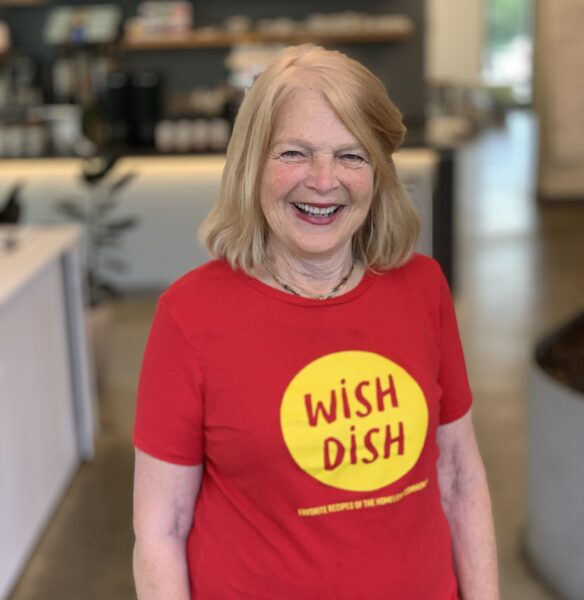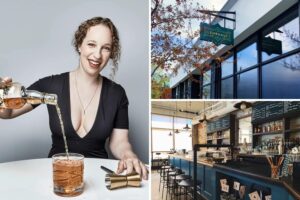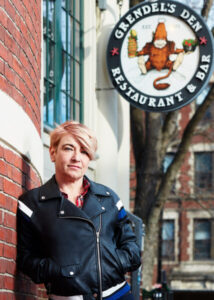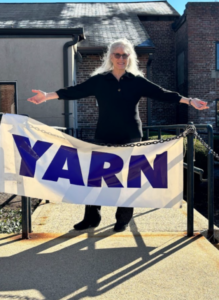Growing up in the South in the middle of the 20th century, Jeanie Gruber learned a lot about hospitality and about how food can support and sustain a community.
As the granddaughter of her community’s rabbi, she also learned a good deal about the principle of tikkun olam, which has to do with every human being’s responsibility to do what they can to repair the world. And now she is using food as a way to support Boston’s homeless community.
Early affinity for helping others
“I always loved people since I was very little,” Gruber recalled, noting a special affinity for the elderly, handicapped, and other people who were often at risk of “feeling lonely or left out.”
As she grew up, Gruber even took vocational tests to see if service was to be her life’s work.
“Sometimes I wished I wanted to do something other than helping others,” she admitted, “but [service] was all that showed up!”
Brain before belly
Starting her career as a therapist, Gruber got to know and support people at profoundly deep levels and in meaningful ways.
“I liked listening to people’s problems,” she explained. “I didn’t give a lot of advice; I mainly listened. And I knew I wanted to officially be able to listen, and hoped to help others.”
These days, in her two home bases of Newton and New Orleans, Gruber shares her sense of Southern hospitality. She also uses her knack for being a supportive listener with friends, neighbors, and many who often do not receive such support and treatment from others.
Catering launched cooking business
Though service and support were clearly her callings, Gruber found other ways to manifest it in places outside of her therapy practice, including the kitchen. Though she had long cooked for herself and her family, Gruber’s olfactory outreach soon extended into a commissary and catering company that was originally called Southern Comfort Cooking and now is known simply as Miss Jeanies Catering Company.
“I actually liked cooking just for the experience of bringing amazing ingredients together in a hopefully tasty dish that people enjoyed,” she said. “I loved creating what would feel good to the other. After all, it was not my party―it was theirs!”
Making each menu from scratch (instead of offering a set of options from which her clients could pick and choose), Gruber continued to use food as a way to connect with and support others on their terms.
“I would listen and explore what was going to make their party ‘them,’” she reasoned, recalling her parallel passion for listening and coming to understand other people. “My catering company attempts to manifest the individuality and dignity of each client or honored person.”
Serving the homeless
These ongoing desires to serve the stomach and soul and to use faith and food to repair the world and serve the underserved have most recently culminated in a new initiative called The WishDish Project.
Wish Dish not only helps feed members of the homeless community, but offers them Gruber’s freshly-made renditions of their own favorite family recipes.
“Wish Dish is a perfect extension of what my approach had been to catering already for 20 years,” Gruber maintained, noting how each Wish Dish is prepared at the behest of one individual member of the homeless community and then shared with the rest of their community.
“Many homeless people do not feel noticed or special in any way,” Gruber observed. “They feel they are a number, one of the masses…[and] many are separated from their families. It feels so good to them to feel their preferences are taken seriously!”
In order to share the Wish Dish model, Gruber is working on a cookbook and is reaching out to other homeless supporters to bring new wishes and dishes to others in need.
“I would love to open other projects in Boston and other cities throughout the country,” she said, inviting people to reach out with ideas.
Farm project coming next
Speaking of reaching out, Gruber’s latest community-building offering is Wonder Root Farm, a gathering place in Stow, that, she said, is intended as a site and source of “purposeful repurposing” (using what you have to make what you want). It will soon be hosting classes, workshops, and experiences related to food insecurity and waste, community and environmental support systems, and, of course, cooking.
“Wish Dish and the farm are meant to further the awareness of food rescue and applications for making certain we all have ‘enough,’” Gruber declared. “It is where all I have done and all that matters to me most will come together!”
This piece originally ran in Fifty-Plus Advocate.





